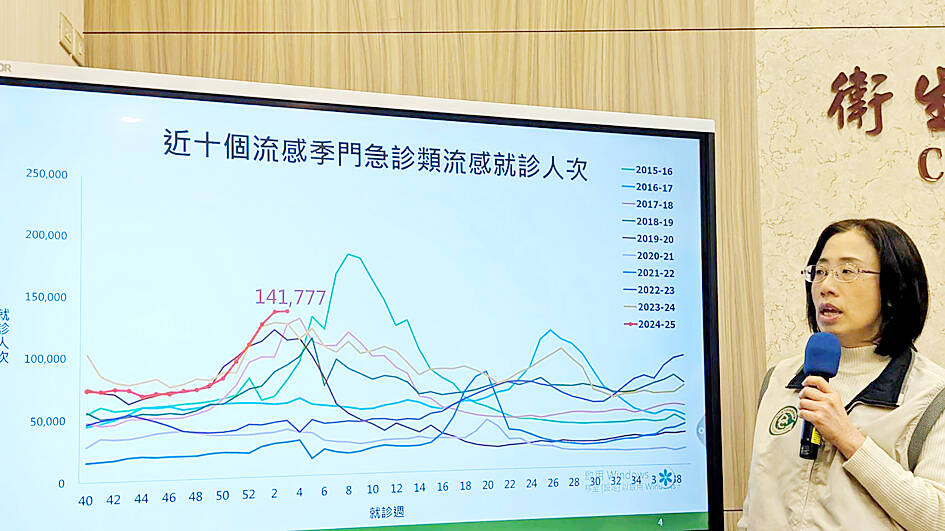Weekly hospital visits for flu-like illnesses last week were the highest for the period in 10 flu seasons, while the first case of infant botulism in Taiwan in four years was reported, the Centers for Disease Control (CDC) said yesterday.
CDC Epidemic Intelligence Center Deputy Director Lee Chia-lin (李佳琳) said there were 141,777 hospital visits for flu-like illnesses between Jan. 12 and Saturday, the highest for the week in 10 flu seasons.
The weekly number is projected to continue increasing, Lee added.

Photo: CNA
Sixty-four cases of severe flu were reported last week, with 90 percent having influenza A(H1N1), she said, adding that 86 percent of the people with severe flu were unvaccinated this flu season.
Six flu deaths were reported last week, she said.
Flu activity in Japan, South Korea, China and Hong Kong is high; while it is high and rising slightly in Europe; increasing in Canada; and reducing, but still above the epidemic threshold in the US, Lee said.
CDC physician Lin Yung-ching (林詠青) said the youngest of the people who died with the flu last week was a man in his 30s who was immunocompromised and unvaccinated.
The man was hospitalized for pneumonia and died of septic shock three weeks later, Lin said.
The youngest person with severe flu last week was a baby aged between six months and one year who had cold-like symptoms, he said,
The girl was hospitalized with low blood oxygen and pneumonia, and was being treated in an intensive care unit after spending more than 10 days in hospital, he said.
Meanwhile, a child under the age of one was diagnosed with botulism, the first case in the country in four years, Lee said.
The baby, who lives in northern Taiwan, does not have a congenital disease, but developed symptoms including constipation, loss of appetite and decreased vitality from Dec. 22, Lin said.
She was taken to a hospital for treatment on Jan. 4, Lin said.
The medical team initially suspected an intestinal obstruction or a congenital intestinal disorder, but examinations showed a deep tendon reflex disorder, droopy eyelids and limb weakness, while neuroimaging scans showed no brain abnormalities, he said.
Further tests detected Clostridium botulinum in her feces and she was diagnosed with infant botulism, Lin said, adding that she has been treated with an antitoxin and her symptoms have eased after being hospitalized for more than two weeks, although she is still in an intensive care unit.
The girl’s family said her diet is mainly breastmilk with some canned foods, such as fruit sauces and pureed vegetables, Lin said, adding that the local health department has collected samples of the canned food for testing.
C botulinum is widespread, usually found as spores, Lin said.
Honey is a typical culprit in contamination cases, he said, adding that the bacteria can produce a neurotoxin that causes botulism, with symptoms including blurred or double vision, drooping eyelids, difficulty speaking and swallowing, and muscle weakness.
It can be fatal if not treated promptly, he said.
The intestinal tracts of infants lack some protective bacteria and they have weaker immunity, so if they ingest the spores, the bacteria can colonize the intestine and produce a toxin, leading to botulism, he said.
Adults should avoid feeding honey to children younger than one, while fruits and vegetables should be thoroughly washed and their skins removed to negate possible contamination from soil, he said.
People should avoid eating canned food or food from jars when the lid has swollen, he added.

Beijing could eventually see a full amphibious invasion of Taiwan as the only "prudent" way to bring about unification, the US Department of Defense said in a newly released annual report to Congress. The Pentagon's "Annual Report to Congress: Military and Security Developments Involving the People's Republic of China 2025," was in many ways similar to last year’s report but reorganized the analysis of the options China has to take over Taiwan. Generally, according to the report, Chinese leaders view the People's Liberation Army's (PLA) capabilities for a Taiwan campaign as improving, but they remain uncertain about its readiness to successfully seize

Taiwan is getting a day off on Christmas for the first time in 25 years. The change comes after opposition parties passed a law earlier this year to add or restore five public holidays, including Constitution Day, which falls on today, Dec. 25. The day marks the 1947 adoption of the constitution of the Republic of China, as the government in Taipei is formally known. Back then the Chinese Nationalist Party (KMT) governed China from Nanjing. When the KMT, now an opposition party in Taiwan, passed the legislation on holidays, it said that they would help “commemorate the history of national development.” That

Taiwan has overtaken South Korea this year in per capita income for the first time in 23 years, IMF data showed. Per capita income is a nation’s GDP divided by the total population, used to compare average wealth levels across countries. Taiwan also beat Japan this year on per capita income, after surpassing it for the first time last year, US magazine Newsweek reported yesterday. Across Asia, Taiwan ranked fourth for per capita income at US$37,827 this year due to sustained economic growth, the report said. In the top three spots were Singapore, Macau and Hong Kong, it said. South

Snow fell on Yushan (Jade Mountain, 玉山) yesterday morning as a continental cold air mass sent temperatures below freezing on Taiwan’s tallest peak, the Central Weather Administration (CWA) said. Snowflakes were seen on Yushan’s north peak from 6:28am to 6:38am, but they did not fully cover the ground and no accumulation was recorded, the CWA said. As of 7:42am, the lowest temperature recorded across Taiwan was minus-5.5°C at Yushan’s Fengkou observatory and minus-4.7°C at the Yushan observatory, CWA data showed. On Hehuanshan (合歡山) in Nantou County, a low of 1.3°C was recorded at 6:39pm, when ice pellets fell at Songsyue Lodge (松雪樓), a